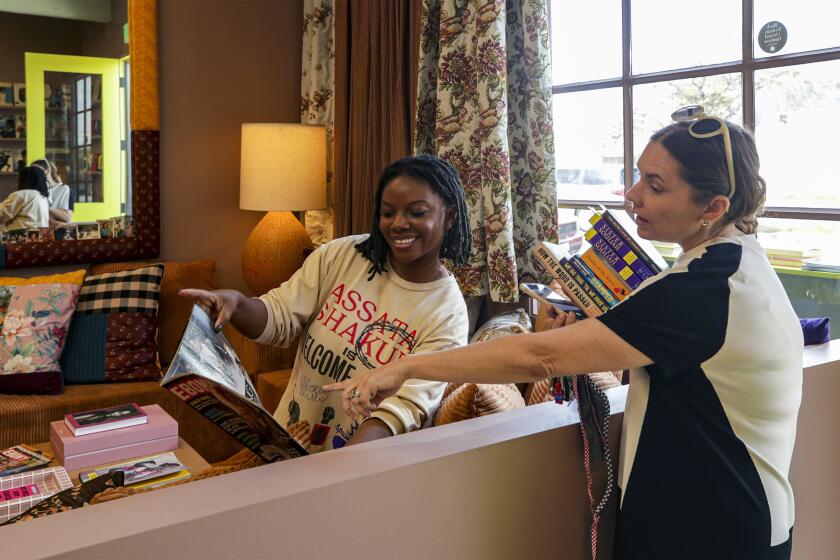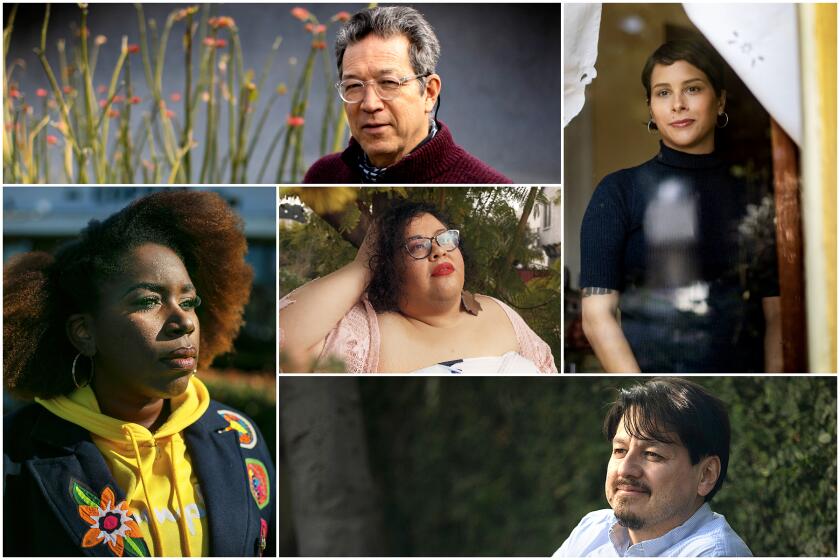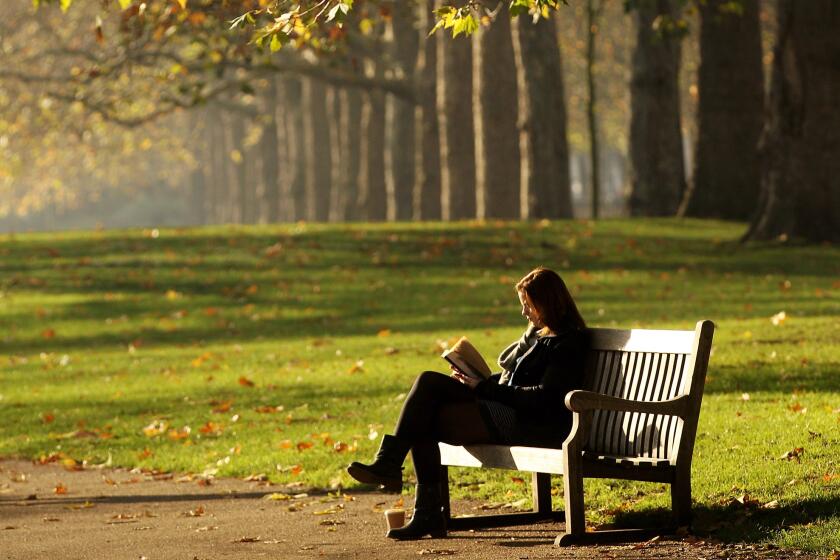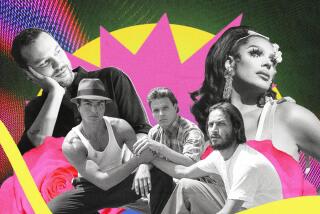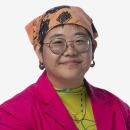After COVID lockdowns, an essential L.A. community reemerges: the poets
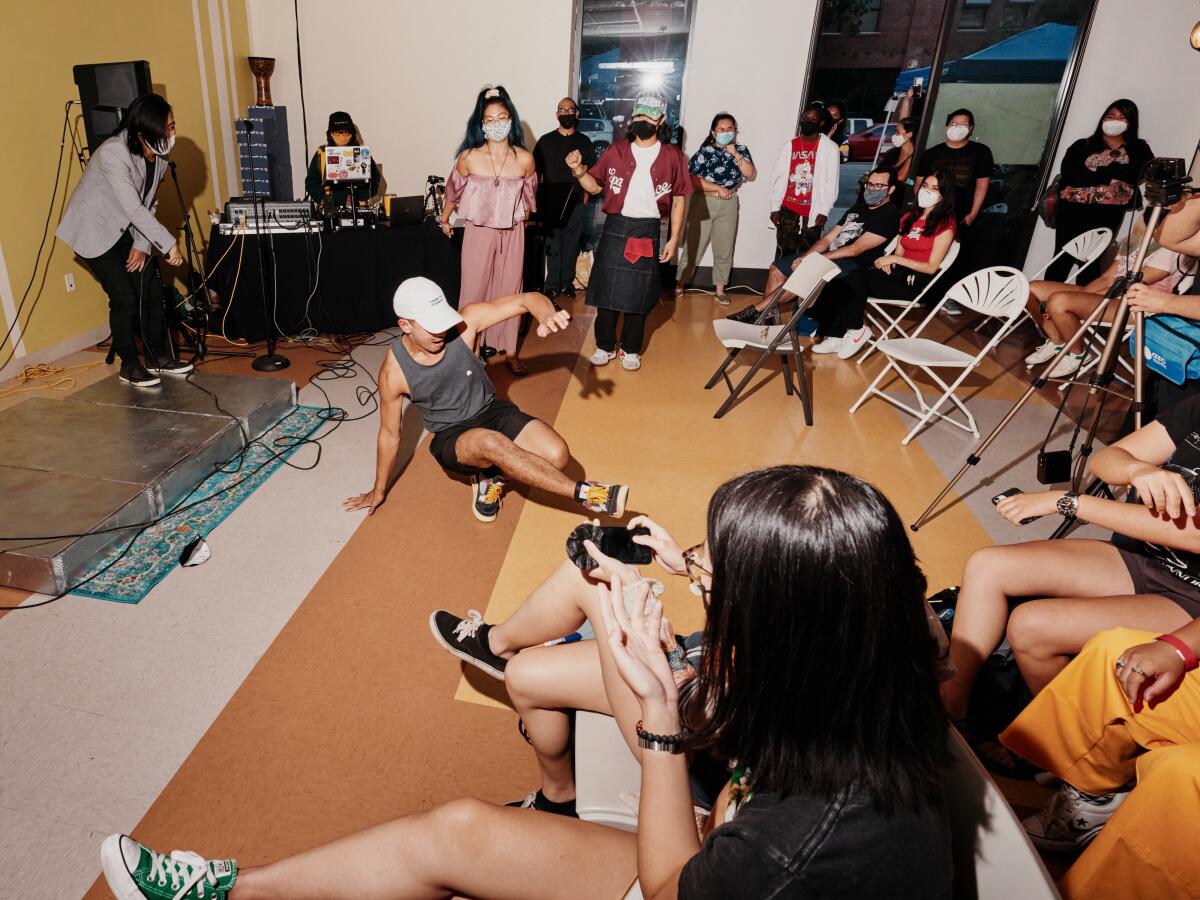
- Share via
The sun was setting into the haze, birds circling above an outdoor stage set up in a private residence at the top of Montecito Heights, as poets read of heartache and survival to an audience seated on hay bales.
The occasion was “Readings at Sunset: A Queer Poetry Night,” and before the pandemic, its host, Cuties Los Angeles, was a coffee shop in East Hollywood. The store closed under COVID’s financial strain, and now it has evolved into a virtual space curating in-person and online LGBTQ events.
That golden August evening was a sign of renewal but also of potentially irreversible change. Over a year marked by illness, anxiety and economic turmoil that has hit event venues particularly hard, poets found creative ways to gather online, but as social distancing measures have eased even in the face of the Delta variant, the vibrant poetry scene in Los Angeles is beginning to make a tentative comeback, with new sites established and old spaces reborn.
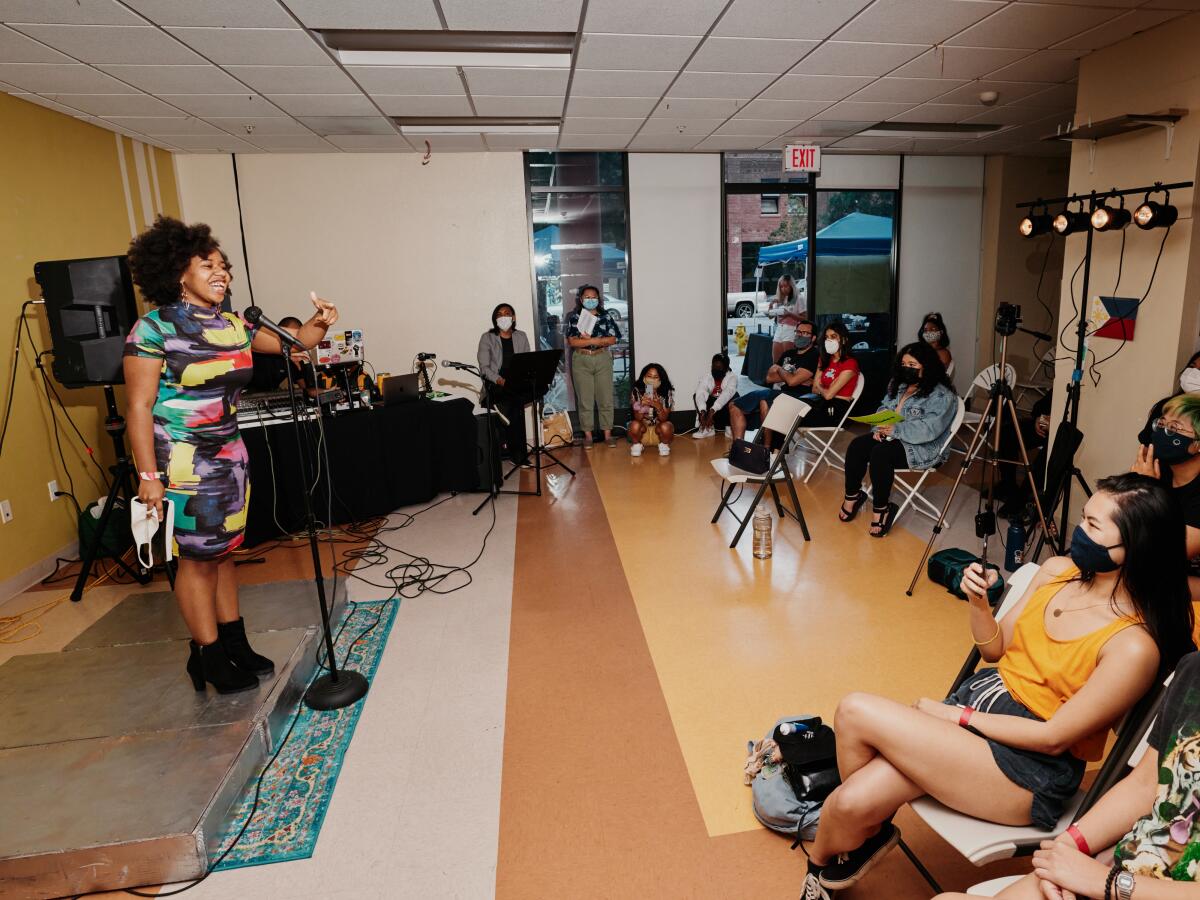
Among the new arrivals, open to masked audiences with proof of vaccination, are the Sims Library of Poetry in South L.A. and Re/Arte Centro Literario in Boyle Heights. Other hosts, including Sunday Jump in Historic Filipinotown and the Autry Museum of the American West, are Southern California mainstays making similarly cautious returns.
Re/Arte, an extension of the literary journal Dryland, opened in June as pandemic restrictions were easing and quickly became a fixture of Boyle Heights. Viva Padilla, the owner and editor-in-chief of Dryland, said she was inspired by some of Cuba’s cultural centers to envision her store as a neighborhood gathering place, selling affordable books and hosting conversations on Latinx politics and literature.
After a brutal year of economic uncertainty, booksellers in L.A. are expecting a full recovery. But the June 15 reopening is reigniting safety concerns.
“When the opportunity came up to do it and I was able to, I was like, ‘I’m gonna just jump on it,’ and the timing was just perfect,” said Padilla.
The venue’s open-mike event, Grito de Boyle Heights, is hosted by Sammy Quetzalli on the second and fourth Wednesday of each month. During its second night, the interior was so crowded that audience members spilled out into the street, leaning into the doorway to hear the verses.
One of the featured poets that night, Xolayruca, performed in a mix of Spanish and English, her stories rooted in her upbringing in the city of Bell. It wasn’t just her first time headlining an in-person event since the start of the pandemic — it was her first live poetry event of any kind in more than a year.
“To have that kind of joy for Black and Indigenous people of color during these times is such an act of revolution,” said Xolayruca. “It just feels like a renaissance for my soul.”
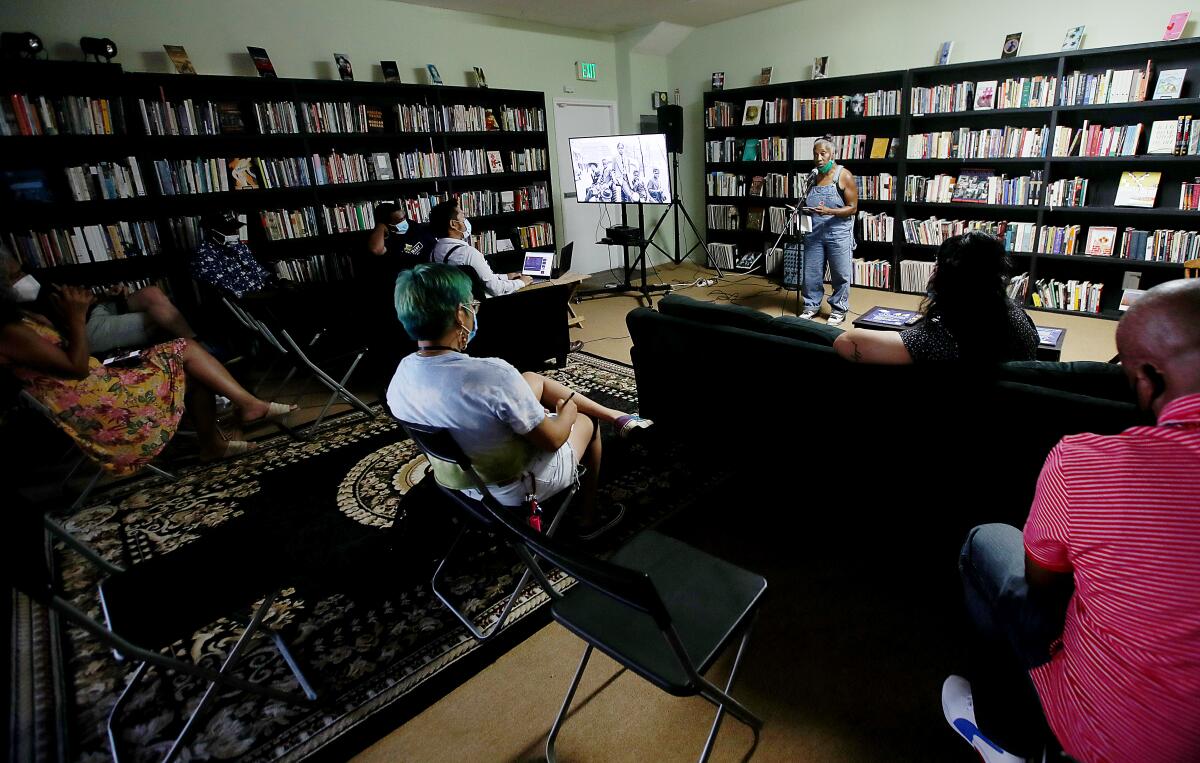
Sims Library of Poetry had even more modest beginnings; USC professor Hiram Sims began lending poetry books out of his suitcase. Having officially opened last month, complete with a lounge and study area and housing more than 5,000 books, it is one of the few such spaces in the country dedicated to the performance, study and writing of poetry.
Sims’ friend and colleague, who goes by the moniker AKoldPiece, was the host of “Pages on Stages,” a recent reading featuring six graduates of the Community Literature Initiative poetry publishing class. The cozy carpeting and affirming chorus of “mmhmms” was a comforting reminder of the intimacy and live charge on which performance poetry thrives.
“I want people to treat this as a religious center,” said AKoldPiece in an interview. “[For] a lot of us, poetry saved our lives, and that faith has brought us together.”
COVID-19 canceled in-person author readings. Now the world is reopening. We ask five L.A. poets for their takes on what lies ahead.
Older venues that survived the pandemic are reopening to communities where they function not only as creative outlets but as cultural magnets. Sunday Jump has resumed in-person events at the Pilipino Workers Center — with limited attendance and masks required — after holding open mikes exclusively online since the pandemic spread.
The organizers have picked up a few lessons from livestreaming, and still offer it to anyone uncomfortable with attending in person. But they expressed relief at being able to gather again in the old neighborhood.
Stephanie Sajor and Eddy M. Gana Jr., Filipino American poets who perform as the duo Steady, are two of the co-founders of Sunday Jump. “My parents met in the neighborhood,” said Sajor of Historic Filipinotown. “I had a grandmother who lived [here] and they would attend community stuff here.”
The most common misconception about the area, said Gana, is that the Filipino presence is a relic of the past. With the open mike, Sunday Jump hopes to encourage exploration of the neighborhood’s still-living roots.
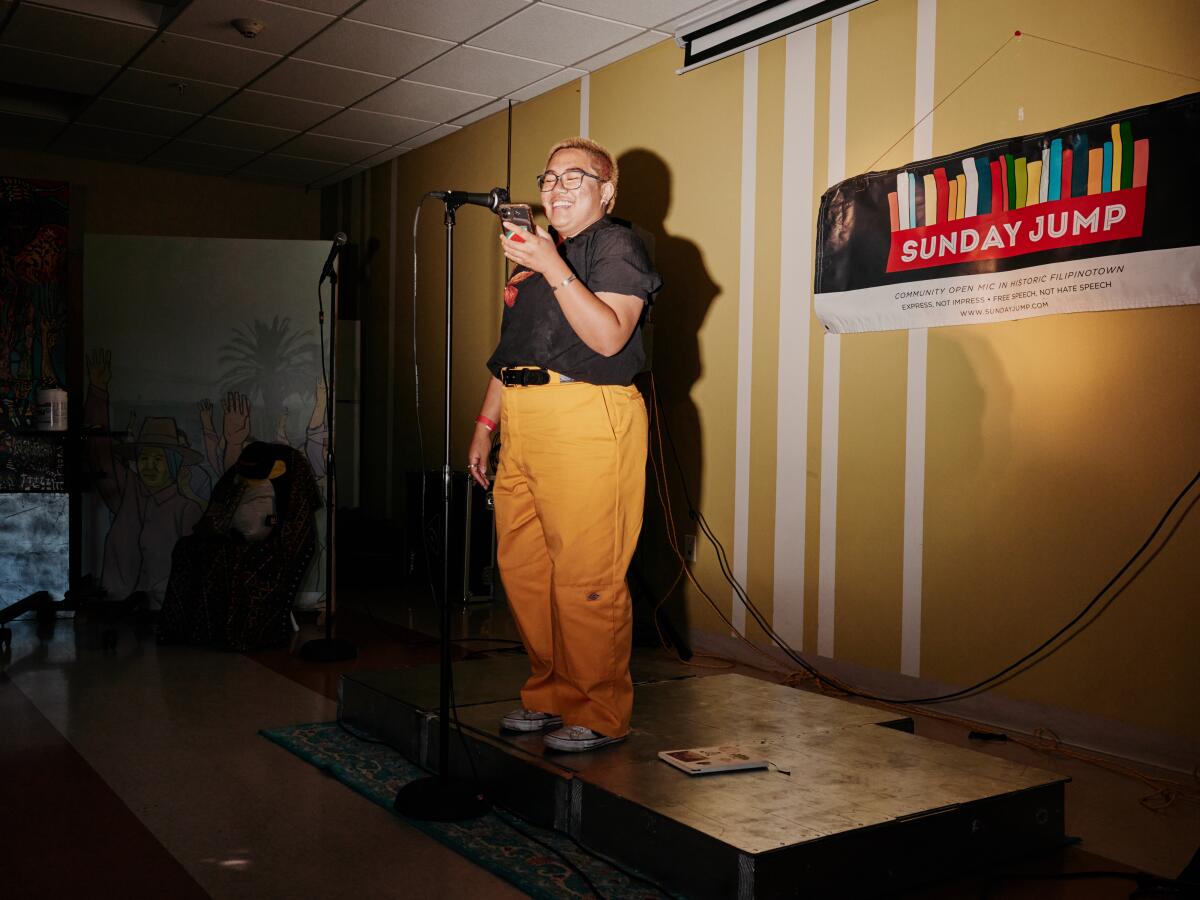
As much as these poets are defined by the city, their work also helps define L.A. One of its most visible poets, Yesika Salgado, has used her platform to boost the work of other locals. Her latest event, “Trailblazer,” a poetry series centering women’s stories, is organized in collaboration with the Autry — the museum’s first post-pandemic outing.
Danyeli Rodriguez Del Orbe and Rhiannon McGavin both celebrated their newest books at “Trailblazer.” They had weathered the pandemic, as most writers have, by finding alternative ways of promoting their projects in a world without book tours.
Del Orbe, an L.A. transplant raised in the Bronx, self-published her first poetry book last year. Instead of traveling across college campuses, she performed from inside her home. There were some silver linings among the challenges.
“Fall of 2020 ended up being one of my most successful [seasons],” said Del Orbe. “Universities were able to pay — yes, less, but you also didn’t spend that money traveling.” It helped too that book sales rose during the pandemic, serving readers in their quarantined spare time.
During the pandemic, book sales rose across the U.S. This fall, publishers are counting on major releases to keep it up — but also a return to normal.
Aman K. Batra, another poet featured at “Trailblazer,” also has seen the benefits of online performance and teaching. “We have students from Nigeria, two in India, one in Bangladesh, the U.K., Canada, like everywhere,” she said. “I wouldn’t change that experience for anything in the world. I would love to keep some kind of hybrid model.”
But few poets would trade their travel budgets for the thrill of performing. For McGavin, a native Angeleno and L.A.’s 2016 youth poet laureate, it’s difficult to generate the same level of excitement through a screen.
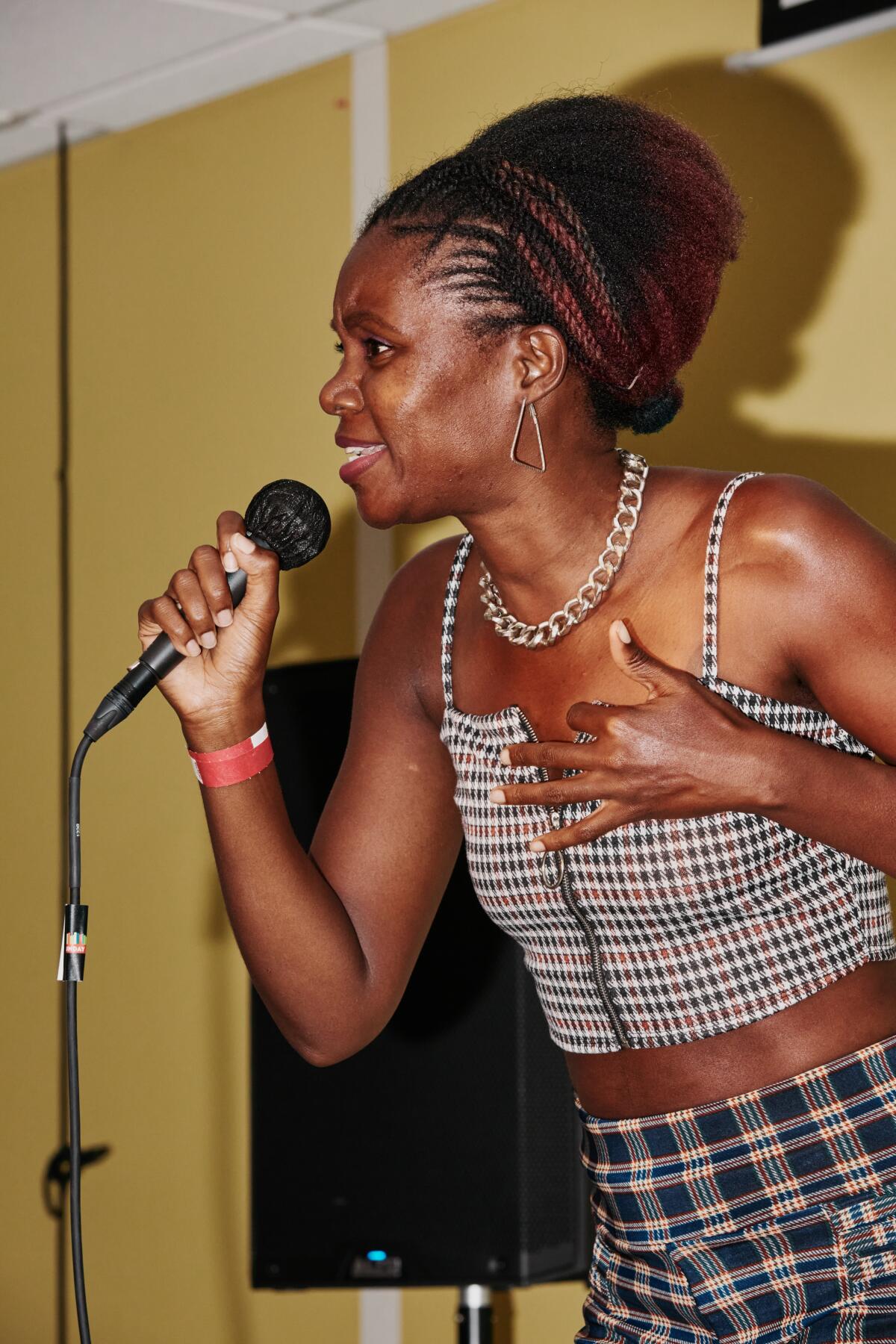
“I miss people so much,” said McGavin. “Poetry is an auditory form, a sonic form of art as much as it is written. I need the sound to go through other people’s bodies.”
Jacqueline Amezcua, who attended Cuties’ queer-centered reading, remembers the first time her high school teacher took her and her classmates to Da Poetry Lounge in Fairfax. As an audience member, she thinks of readings as more than just a chance to see a poet in person.
“A big part of the live poetry events is also the communities, the environment that the audience creates,” said Amezcua. “It’s actually a conversation between the audience and the performer, and I think you miss that when you’re online.”
There is also spontaneity. At the Re/Arte reading, a glass bowl passed around for donations slipped and shattered all over the floor. After an awkward silence, the audience erupted in laughter. Something unexpected had happened — not a Zoom malfunction in the ether but a bowl breaking in Boyle Heights. Witnessing it felt like a privilege.
She became the national youth poet laureate at age 16; six years later, she read her poem at Joe Biden’s and Kamala Harris’ historic swearing-in.
More to Read
Sign up for our Book Club newsletter
Get the latest news, events and more from the Los Angeles Times Book Club, and help us get L.A. reading and talking.
You may occasionally receive promotional content from the Los Angeles Times.
